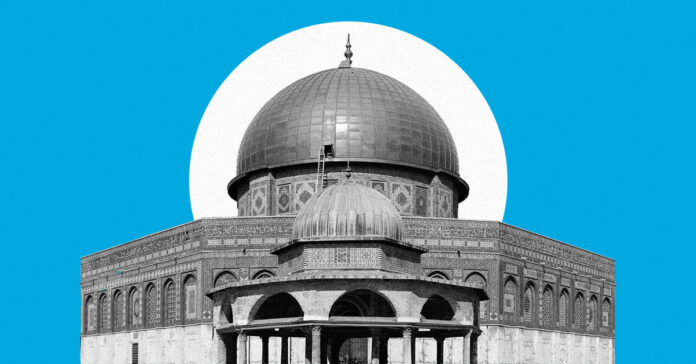What the Muslim sees in Israel is European and American settlers established in a Muslim country with the support of the former imperial powers and maintained there by American arms. A ‘secular’ Jew is, for him, a contradiction in terms. So far as he can judge, most Israelis, particularly those in the ruling group, are not Jews at all. They look like Europeans, they talk like Europeans, they think like Europeans and – most important of all – they exhibit precisely those characteristics of aggressiveness and administrative efficiency which the Muslim associates with European imperialism. The parallel with the Crusades is painfully obvious. Westerners have again come to Palestine; they again occupy the Holy City of Quds (Jerusalem). The misfortunes of the Jews as a ‘race’ – the pogroms and the holocaust itself – were certainly not the fault of the Muslims. Europe’s guilt is Europe’s business, and they do not see why they should be expected to suffer for it. ‘Why do you not give the Jews some of the choicest lands of Germany?’ King Abdu’l-Aziz Ibn Saud asked President Roosevelt. He might as well have suggested, no less reasonably but no more profitably, that the Americans, if they felt so strongly on this subject, could quite well spare one of their own forty-eight states (Texas perhaps) as a home for the Jews. The ‘white man’; as the Arabs see it, is more inclined to give away other people’s territory than his own.
Many Muslims are convinced that Western support for Israel can be ascribed quite simply to hypocrisy. They believe that Europe and the United States created Israel as a means of ridding themselves of their Jewish populations. However absurd this accusation may seem to Europeans and Americans the fact remains that Zionism arose as a reaction to anti-Semitism and, in the view of its founders, ‘needed’ anti-Semitism. Theodor Herzl himself was not afraid to say that ‘the anti-Semites will become our surest friends and the anti-Semitic countries our allies.’
For educated Muslims who identity with the Palestinians, the humiliation of being treated as ‘natives’ who could be pushed aside to make room for white men and women was intensified by the failure of superior Arab forces to dislodge these ‘settlers’. At the very time when Western imperial power was making a discreet withdrawal elsewhere in the world, they were again forced to recognize their own impotence in the face of this power. Humiliation begets rage, and this rage has now sunk deep roots even in the more distant outposts of the Muslim world, most particularly among the young. Turbulent emotions are not easily analysed but one has the impression that these young people reserve their most bitter resentment, not for the Israelis, but for the Americans. To some extent they understand that the Israelis act as they themselves might act under similar circumstances; they cannot, however, forgive the nation but for whose support the state of Israel could not have survived in its present form.
[Islam and the Destiny of Man by Gai Eaton, p. 36-38]









